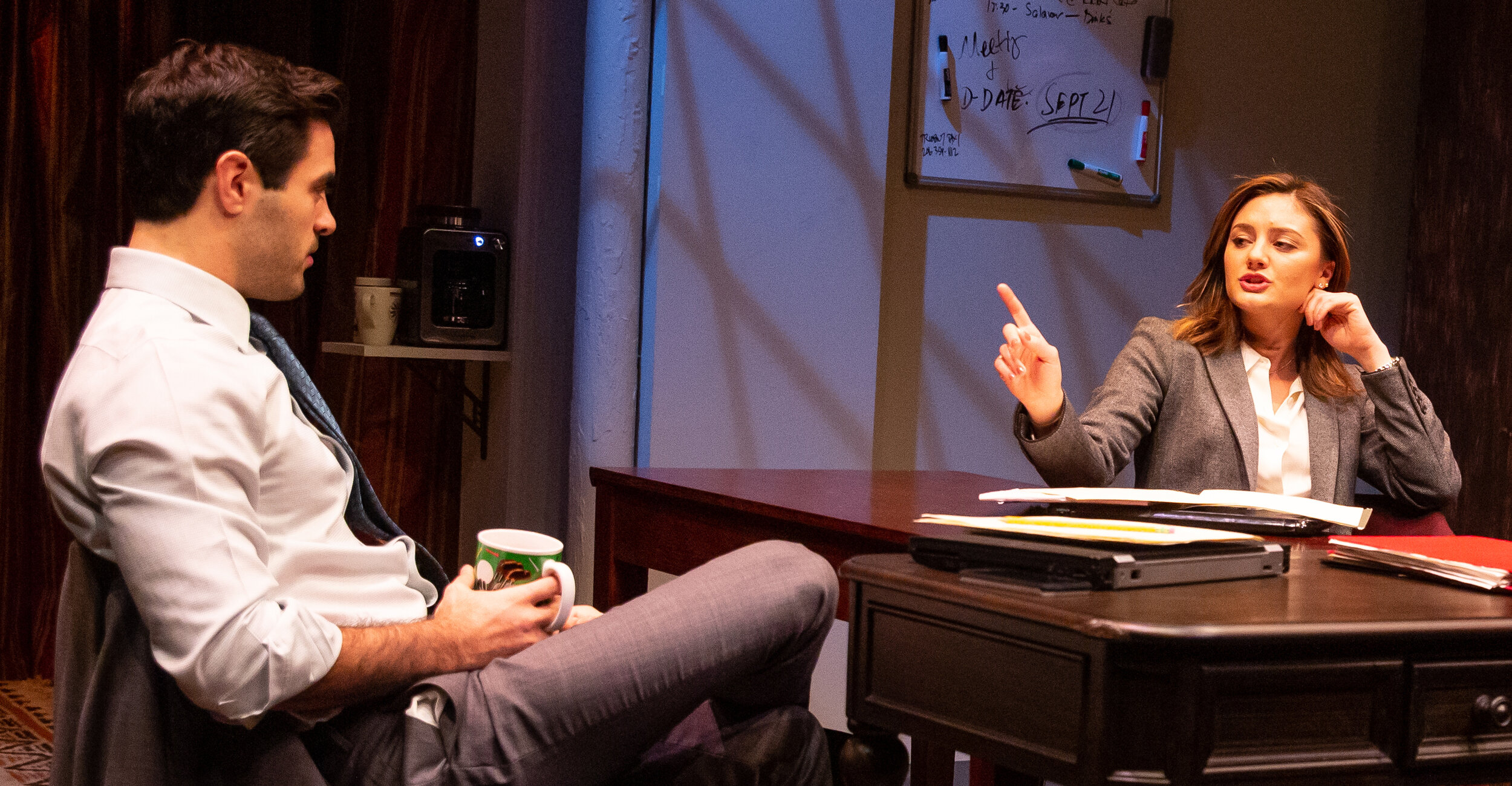Christine Evangelista as Karen (right) with her associate and eventual adversary Dan (Alan Trinca) in Dep Kirkland’s MsTrial.
Not so much a “he said/she said” as a “he pontificates,” MsTrial marks the playwriting debut of Dep Kirkland, a former prosecutor who obviously has insights to share about the legal system. It’s ironic, then, that a scene set during a legal proceeding is where the play goes awry.
John (Dep Kirkland) and Karen (Evangelista) while they are still friendly.
That Act II scene consists of an improbable portrayal of a deposition where both sides ask questions, the attorneys pace, gesticulate and emote as if addressing a jury, and the lawyers, deponent and accused make all kinds of unsolicited, inappropriate remarks. In that scene and the one that follows, the characters often sound like mouthpieces for commentary on the justice system and its handling of sexual-assault allegations, on gender dynamics, on lawyerly ethics, on human behavior in general. There’s also dialogue throughout the play that doesn’t sound like anything anyone would say—quips like “since original sin was original” and a labored Alice in Wonderland metaphor. The script’s lack of subtlety and plausibility dooms a play that starts out as a mildly engaging story of high-powered trial attorneys and an alleged sexual assault between them.
Those attorneys are John Paris, a superstar of civil litigation, and his colleague Karen Lukoff, who earned her own killer reputation while working in the local district attorney’s office. After a drunken party celebrating their victory in court, she accuses him of rape.
Karen is played by TV actress Christine Evangelista, who makes a game effort but never fully convinces as a trash-talking hard-ass. It doesn’t help that her role is an epitome of the “cool girl” male fantasy that Gillian Flynn disparagingly labeled in Gone Girl: beautiful in a female sense but just one of the guys in all her sensibilities, skinny despite a diet of burgers and fries. Karen’s an ace lawyer, but still relies on fake crying in court. Regardless of her legal acumen, nobody can see past her looks—which appears to be the only reason the playwright made Dan (John and Karen’s associate) gay; if he were straight, he’d have to be attracted to her, wouldn’t he? And of course, as both John and a female prosecutor mention, other women attorneys resent Karen. Ignore these sexist constraints and Evangelista fares better, portraying a smart but emotionally conflicted professional and, later, vulnerable alleged victim.
Evangelista as Karen with assistant district attorney Cathryn Baker (Janie Brookshire, right). Photographs by Jeremy Daniel.
Kirkland cast himself as John, and he comes off as too boorish instead of striking a balance between charming and aggressive, a dichotomy that’s key to the character and the “mystery” about the sexual encounter. That mystery is solved in the last scene with the same inelegance that plagues the entire second act: plot contrivances, exposition-laden dialogue, personal opinions and snarky remarks relayed in sworn testimony rather than conversation (“It isn’t that difficult for adults to know when someone wants to have sex with them and when they don’t; no has never meant yes, except in frat-boy fantasies”). Furthermore, Dan’s conduct in the final scene is out of character with what’s gone before. While Dan—John’s nephew and protégé—may have been conceived as a nice guy out of his depth who gradually comes under the sway of a not-so-nice guy, Alan Trinca plays it too bland in all the other scenes for that transformation to seem inevitable.
MsTrial, which is directed by Rick Andosca, has a good-looking set: Bill Clarke has designed a plush office, with a large bay window, leather couch and packed bookshelves. Between scenes, however, the stagehands’ activity rearranging furniture and props (visible though the lights are down) takes too long and disrupts the play’s verisimilitude. Lighting designer Mitchell Fenton should use a blackout at another point as well: the end of the first act. John and Karen have kissed, then she pulls away. He continues his pursuit, and they appear to be moving toward each other as the scene ends. The audience can then see the actors walk off the darkened but not dark stage. Given that the plot revolves around the mystery of what happens next, a complete blackout would heighten the suspense and tension.
Before turning to acting and writing, Kirkland had an impressive legal career at the state and federal levels. Yet his theatrical work seems stalled at vanity project: He wrote MsTrial more than 15 years ago, and it had a brief L.A. run (with him in the lead) in 2002. If he’s going to convert his legal experience into worthy theatrical experiences, he needs to abandon stale, unpersuasive characterizations and clunky dialogue.
MsTrial is at New World Stages (340 W. 50th St.). Evening performances are at 7 p.m. Sunday, Monday, Wednesday and Thursday and 8 p.m. Friday and Saturday; matinees are at 2 p.m. Saturday and 3 p.m. Sunday. Tickets are available by calling (212) 239-6200 or visiting telecharge.com.





